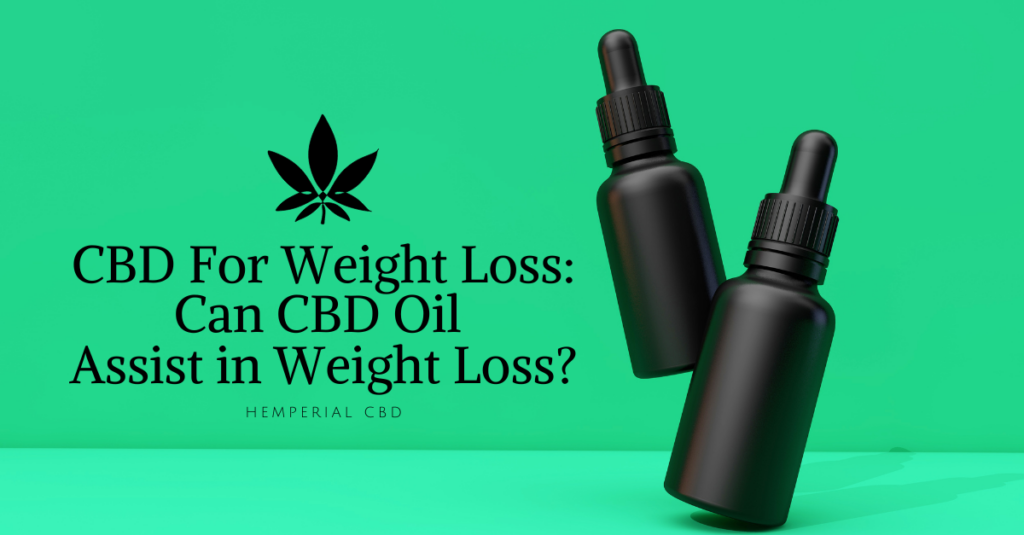CBD For Weight Loss? Most people don’t equate CBD with weight reduction because they think cannabis can actually have the opposite effect, causing appetite to increase rather than decrease. However, CBD itself is not to blame for this impact. The hallmark result of marijuana consumption is the “munchies.”
Although CBD is well known for reducing some of the effects of THC, may it also aid in weight loss?
Is there any proof that cannabidiol has the claimed ability to increase metabolism?
Numerous studies have connected CBD use to lower body weight overall, smaller waist circumferences, and lower body mass indices (BMI).
Naturally, this does not imply that you should give up a balanced diet and an active way of life in favor of CBD.
However, you can increase the efficiency of your diet and exercise by incorporating CBD into your routine.
To find out more about how CBD might help you lose weight, keep reading.
CBD For Weight Loss: Can CBD Help You Lose Weight?
Clinical endocannabinoid deficiency, in which the endocannabinoid system (ECS) fails to produce enough endocannabinoids to maintain homeostasis inside the body, has lately been related to metabolic disorders.
Humans have a large native regulatory network called the ECS, and cannabinoid receptors may be located all over the body. Every organ in your body has cannabinoid receptors, but the neurological and immune systems have the highest amounts.
Endocannabinoids are the neurotransmitters secreted by the ECS. They are required by the body in order to communicate with cells via cannabinoid receptors. On a chemical level, phytocannabinoids—those derived from cannabis plants—like CBD and THC are very similar to endocannabinoids.
A vast range of crucial functions, such as memory, mood, inflammation, body temperature, appetite, fertility, pain transmission, sleep cycles, and more, are carried out by the endocannabinoid system.
The ECS’s responsibility is to keep each of those functions in balance. This equilibrium is known as the aforementioned homeostasis, and when it is disturbed, it can lead to either hypo-activity or hiper-activity of the endocannabinoid system, which can allow for the development of dysfunctions and disorders.
Endocannabinoid deficiency has been linked to recent studies looking at the issues of diabetes, metabolic syndrome, and obesity.
What Are the Potential Weight Loss Benefits of CBD?
We consume more calories than we can burn, which is a straightforward explanation for why we acquire weight (let out).
Numerous factors influence how well we naturally burn fat, and altered metabolism is frequently caused by hormone imbalances, variations in metabolic rate, the presence of inflammation, and endocannabinoid system activity.
Your body can maintain a healthy balance between the digestive, immunological, and neurological systems thanks to the ECS, which also helps to support gradual weight loss.
How might CBD help to speed up your metabolism and modulate your endocannabinoid system?
Here is what the most recent research on utilizing CBD for weight loss has to offer.
1. Aids in Controlling Appetite
Many CBD users have discovered that CBD oil reduces their appetite, which aids in weight loss.
The majority of people equate cannabis with stimulating hunger, but although it’s true that CBD may do so, CBD can also have the exact opposite effect.
THC increases appetite through activating the CB1 cannabinoid receptor in the brain, which has a number of other effects as well. However, a 2018 study found that because CB1 receptor blockers can diminish its activity, they may help reduce appetite and control obesity.
CBD can instruct other chemicals to block CB1 receptors even if it cannot activate them directly. This can reduce appetite and prevent binge eating in some people.
Finally, rats treated with CBD demonstrated decreased hunger, according to a 2012 study done on animal models. Although there is a lot of anecdotal evidence that CBD can reduce hunger, there haven’t been any human studies done in this area yet.
2. Encourages Fat Browning
A further claim made by supporters of CBD is that it can change white (or unhealthy) fat into brown fat, perhaps improving the body’s capacity to burn calories.
A 2016 study backs up the fat conversion hypothesis. Researchers who participated in that study discovered that CBD can affect numerous aspects of how the body deals with fat.
CBD aided in the transformation of white fat cells into brown cells, which helped the body break down fats more effectively.
Compared to white fat cells, brown fat cells are more active. They generate heat by using energy, promoting thermogenesis and boosting the body’s capacity to burn calories.
3. Could Lower Your Risk for Metabolic Disorders
Researchers have suggested obesity as a potential cause of hypertension, high cholesterol, and type 2 diabetes in a 2018 study on CBD and metabolic disorders.
The overstimulation of CB1 receptors in the body may be the cause of this. Obesity and a number of metabolic problems may result from the body’s fat tissue having too many CB1 receptors engaged.
CBD may also reduce the risk of obesity since it can subtly block CB1 receptors.
The potential of CBD to treat metabolic diseases, mostly in rats, was the subject of several earlier research, according to a review published in Cannabis and Cannabinoid Research. For instance, after the trial, rats who received CBD exhibited a 25% reduction in total cholesterol. Additionally, CBD’s anti-inflammatory and antioxidant qualities contributed to decreased blood sugar levels and enhanced liver health markers.
4. Aids the Body’s Utilization of Glucose

You can take care of healthy metabolic processes using CBD.
When you eat food, your blood sugar levels rise, and the pancreas subsequently releases insulin to carry the glucose to the body cells. This is an example of a healthy metabolic process. Glucose serves as a source of energy for the cells.
The system will become compromised if your diet consistently contains too much glucose. Body cells grow resistant to insulin’s signals to provide energy while they are surrounded by glucose.
The pancreas starts storing insulin when blood glucose levels rise dangerously high. The rapid insulin secretion will result in a surge in glucose levels.
The aforementioned circumstance may encourage an unhealthy metabolism, in which you eat, your blood sugar levels rise, but the insulin resists delivering glucose to your cells, causing the liver to start converting sugar to fat in an effort to safeguard your body from high sugar levels. Because the cells are left without energy, they become more sugar-hungry.
According to a 2018 study, cannabinoids like CBD, CBN, and THC increase cells’ capacity to absorb glucose in a manner comparable to that of the diabetic drug metformin.
We are able to control our hunger if the body can use more blood sugar before turning it into fat.
5. Could be Beneficial for Mitochondrial Dysfunction
A Cell’s mitochondria function as energy hubs. Insulin carries glucose into the cell, where the mitochondria utilize it to fuel the body and brain. But when your metabolism is hampered and insulin refuses to supply glucose to your cells, the mitochondria’s performance is also hampered.
Cells’ mitochondria function as energy hubs. Insulin carries glucose into the cell, where the mitochondria utilize it to fuel the body and brain. But when your metabolism is hampered and insulin refuses to supply glucose to your cells, the mitochondria’s performance is also hampered.
The majority of illnesses characterized by glucose fluctuation entail mitochondrial malfunction, which may also be a risk factor for the development of gastrointestinal cancer. On the other hand, robust mitochondria guarantee ongoing vitality.
In a 2016 study, scientists examined how CBD affected the metabolic health of fat cell cultures. After CBD administration, the study discovered a notable improvement in mitochondrial activity.
6. Reduces Inflammation
CBD can enhance immune system cell communication, which helps to reduce inflammation. Chronic inflammation is a common component of metabolic diseases, particularly in the pancreas.
Too much insulin is secreted by an overactive pancreas, which causes inflammation across the entire gland and harms the beta cells responsible for producing insulin.
The risk of diabetes and obesity might be dramatically increased when the body can no longer create enough insulin.
Researchers found a connection between inflammation and an overactive endocannabinoid system in a 2016 study [9]. Additionally, they discovered that CBD’s anti-inflammatory and antioxidant qualities can aid in resolving this problem.
7. Encourages Liver Regeneration Processes
The destruction of liver cells is another typical indicator of diabetes and obesity. The conversion of the body’s stored energy into usable energy is mostly controlled by the liver. Regularly consuming too much sugar can gravely harm this system. The development of dysfunction is signaled by liver inflammation, which can also play a role in non-alcoholic fatty liver disease.
Researchers looked at the effects of CBD and THCV on metabolic dysfunction in 2015. The findings suggested that non-psychoactive cannabis can reduce triglyceride levels in the liver by delaying their synthesis. In people with type 2 diabetes, they also reduced blood pressure and improved insulin resistance. These gains were partly credited by the researchers to CBD’s anti-inflammatory effects.
Can CBD Cause Weight Gain?
CBD has long been linked to the danger of weight gain with regular use due to the stereotypes surrounding cannabis users. This characteristic is typical of marijuana strains and goods that are strong in THC, as was stated previously in the text. THC concentrations in hemp-derived extracts are less than 0.3%, which is insufficient to cause intoxication.
However, even if you take a CBD oil made from marijuana, it’s doubtful that you’ll launch an attack on your refrigerator thereafter due to the CBD to THC ratios.
In conclusion, you shouldn’t worry about putting on weight when taking CBD oil.
Conclusion: Is Taking CBD Oil for Weight Loss Advisable?
Numerous studies have demonstrated a connection between poor metabolism and endocannabinoid system malfunction. Endocannabinoid activity levels, according to researchers, should serve as a new indicator of metabolic health.
While CBD oil shouldn’t be viewed as a magic fat-burning supplement or a guarantee of a healthy digestive system, it can be a useful tool for controlling your body’s metabolic processes. Above all, keep in mind the importance of maintaining a balanced diet and frequent exercise. Your metabolism can be accelerated and you can prevent obesity, diabetes, and other metabolic illnesses with nutrient-dense foods and an active lifestyle.
We really hope that this article has enlightened you on the potential advantages of utilizing CBD for weight loss. If CBD has assisted you in losing additional weight, please write a remark below and share with your friends!
